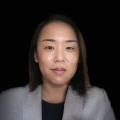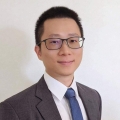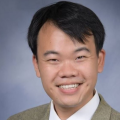Oxford Debate: Will Diplomatic Engagement Prevent China’s Aggressive Actions Against Taiwan?
VIEW EVENT DETAILSWith Simona Grano, Yu-Hua Chen, Amanda Hsiao, and James Lee

VIDEO
WATCH NOW
For decades, Taiwan has existed in a fragile balance, neither truly independent nor unified with mainland China. While this status quo has proven surprisingly enduring, China's continued economic and military rise and its government’s increasing nationalistic rhetoric have increased fears of a conflict around the island – accidental or intentional.
Taiwan's outsized importance – geostrategic as a key element in the first island chain, economically with its semiconductor industry, ideologically as an example of a "Chinese democracy" – mean that the global community has a strong interest in avoiding conflict. With Taiwan gearing up to elect a new president on January 13, there is ample discussion on how to deter China from taking offensive action without risking a provocation.
Is a strong military presence the most effective way to maintain the status quo and discourage offensive actions from China? How strong are the military alliances and the balance of power in the region really? Or are diplomatic engagement, economic partnerships, and international law the way to a more stable and peaceful environment?
In this Oxford Debate we are debating what the better and worse ways are to deter China from Taiwan with Simona Grano, Yu-Hua Chen, Amanda Hsiao, and James Lee.
About Oxford Debates
The Oxford Debates at Asia Society Switzerland are a format to address 'big' questions that have no one answer or solution but are inviting many conflicting views. Four renowned experts in the field form teams of two, one team arguing for the motion, the other against it.
The Oxford-style format is broken down into four sections: opening remarks, rebuttals, a moderated question-and-answer session, and closing remarks. Before and after the debate the audience is polled whether they agree with the motion or not. The voting breakdown is not shared publicly until the end of the debate. The greater percentage change between the first and second votes determines the debate's winning team.
Disclaimer: Positions presented in the debate do not necessarily represent the speakers' views
Motion: Diplomatic Engagement – More Than Military Deterrence – Will Prevent China’s Aggressive Actions Against Taiwan.
Arguing in favour of the motion:

Simona Grano is an Associate Professor and Director of the Taiwan Studies Project at the University of Zurich. In September 2023, she joined Asia Society Policy Institute's Center for China Analysis as TOY Senior Fellow on Taiwan. As a non-resident Senior Fellow at the Center for China Analysis she will focus on Taiwan issues and the January 2024 elections.
Simona has held research positions and taught China Studies and Taiwan Studies at Ca' Foscari University of Venice in Italy, at the University of Zurich in Switzerland and at National Cheng'chi University in Taiwan. She is a research fellow of the European Research Center on Contemporary Taiwan (ERCCT), in Tübingen, Germany, and a research associate of SOAS, London. Simona is the author of Environmental Governance in Taiwan: A New Generation of Activists and Stakeholders, published in 2015 by Routledge. Her articles have appeared in the Journal of Civil Society, Journal of Current Chinese Affairs, China Information, Asiatische Studien, Taiwan in Comparative Perspective, Orizzonte Cina. Her latest edited volume, China-US Competition: Impact on Small and Middle Powers' Strategic Choices, was published by Palgrave Macmillan in December 2022.
Simona completed her Ph.D. in Chinese Studies at Ca' Foscari University of Venice, Italy in 2008. Picture: © André Hengst

Amanda Hsiao is International Crisis Group's Senior Analyst for China. She focuses on conflicts in which China plays an important role, and developments in China's foreign policy that relate to conflict prevention and resolution. Prior to Crisis Group, Amanda established and managed the Centre for Humanitarian Dialogue's China program in Beijing, designing and facilitating dialogues related to the South China Sea, U.S.-China relations, and China's evolving approach to conflict mediation. Before that, Amanda was a field researcher on the conflicts in Sudan and South Sudan for the Enough Project, AECOM International, and Small Arms Survey. Amanda has degrees from Pomona College and the Princeton School of Public and International Affairs.
Arguing against the motion:

Yu-Hua Chen is an assistant professor in the Global Studies Program at Akita International University (AIU) in Japan. He is a graduate of the Australian National University (ANU) with research interests spanning China’s foreign and security policy, Asian history, international relations theory, and geopolitics. His published articles have been featured in various reputable publications, including The Diplomat, The National Interest, ChinaFile, East Asia Forum, Taiwan Insight, Journal of Contemporary China, and the International Journal of Taiwan Studies. His doctoral research delves into the intricate relationship between buffer states and the formulation of China’s security policies. Before joining AIU, Yu-Hua served as a visiting fellow at George Washington University, a lecturer at ANU, and held the rank of Second Lieutenant in Taiwan.

James Lee is an Assistant Research Fellow (Professor) at the Institute of European and American Studies at Academia Sinica, the national academy of Taiwan. He is also a former Eisenhower Defense Fellow at the NATO Defense College in Rome, an affiliated researcher of the Institute on Global Conflict and Cooperation (IGCC) of the University of California system, and a collaborator of Canada’s Network for Strategic Analysis. He received his Ph.D. in Politics from Princeton University in 2018 and later held research positions at the European University Institute in Florence and the University of California, San Diego.
His research in strategic studies is at the intersection of political science and diplomatic history, with a focus on U.S. foreign policy and the security of Taiwan. His research has been published in Business and Politics, International Studies Quarterly, the Journal of Strategic Studies, the Journal of East Asian Studies, and the Journal of Chinese Political Science. He is also a policy analyst of U.S.-Taiwan relations, with publications in outlets such as Le Rubicon, Global Asia, the Network for Strategic Analysis, and the Georgetown Journal of International Affairs. His working languages are English, Mandarin, French, Italian, and German.